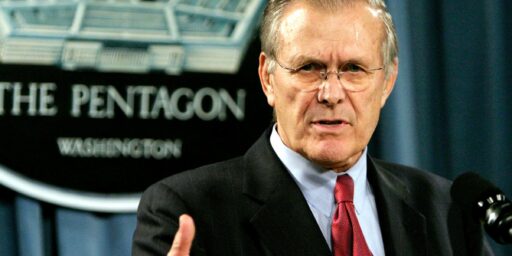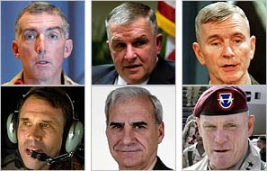MORE TROOPS
Thom Shanker reports that the DOD is contemplating new ways to increase the number of combat troops available without actually increasing the overall size of the military.
The review will be seen in some circles as answering powerful members of Congress who have demanded more active-duty troops for the military. Lengthy deployments to Iraq drew scattered complaints from families of soldiers, and some reservists criticized their extended call-ups.
Some concepts being proposed as ways to enhance combat power challenge core military planning. One questions the long-term practice of earmarking forces in the United States for specific regional war zones, as opposed to ordering the military at large to stand ready to be sent wherever required. Another asks whether advances in intelligence-gathering and analysis allow the nation to anticipate threats with greater accuracy. Such “strategic warning” could direct more efficient plans for assigning troops.
Other proposals are based in pragmatism. Mr. Rumsfeld told Congress he wanted to transfer to civilians or contract workers an estimated 300,000 administrative jobs now performed by people in uniform.
While some on Capitol Hill reject that total as high, one senior Pentagon official said that if even one-sixth of those jobs were converted, then the equivalent of more than two Army divisions could enter the fighting force without any increase in the number of paid military personnel.
In the same vein, Navy planners are complimented for designing ships that use new technologies to cut crew size by perhaps 50 percent.
Another approach is asking allies to help shoulder the burden. Officials say 3,000 Germans now stand guard at United States bases in Germany, replacing Americans sent to Iraq. Before Mr. Rumsfeld asked Germany to provide those patrols, thousands of reservists were almost mobilized for the mission.
All of this seems reasonable enough and continues trends that have been ongoing for the better part of two decades.
Of course, hiring civilians to replace soldiers as, say, cooks doesn’t thereby create more Special Forces troops. The skills sets are hardly fungible. But, in the longer term, it allows the military to recruit and train soldiers for the required specialties.
Further, with the exception perhaps of the forces we have in Korea, inter-regional transferability has been the reality for some time. It was inconceivable that units stationed in Germany in 1990 would be deployed for duty in the Persian Gulf, but many of us were–green vehicles, uniforms, and all! And any of my platoon’s self-propelled rocket artillery pieces–each with a three man crew–had more firepower than a Vietnam era artillery batallion. That’s a huge advantage for combat operations, obviously. It doesn’t help much with constabulary duty, though.




